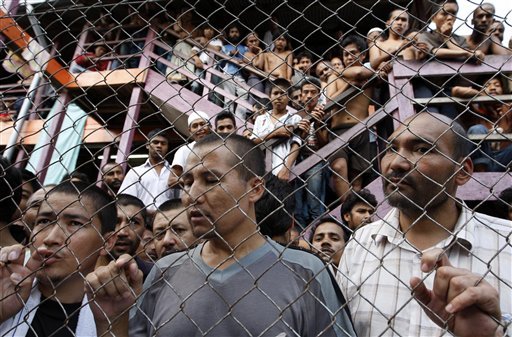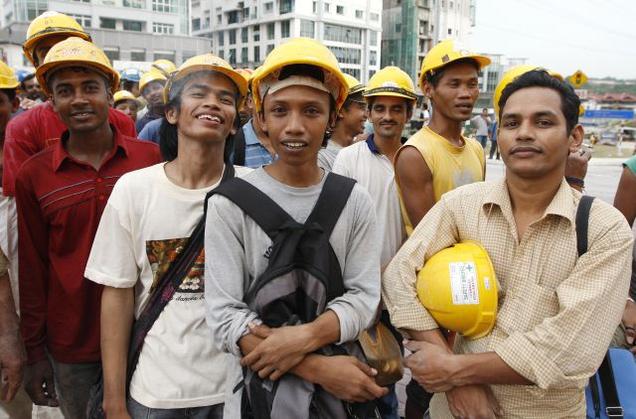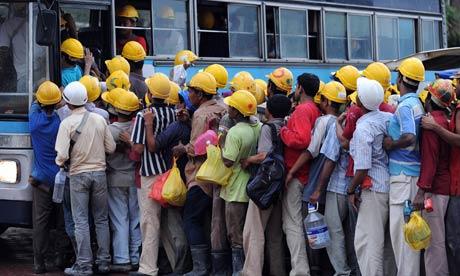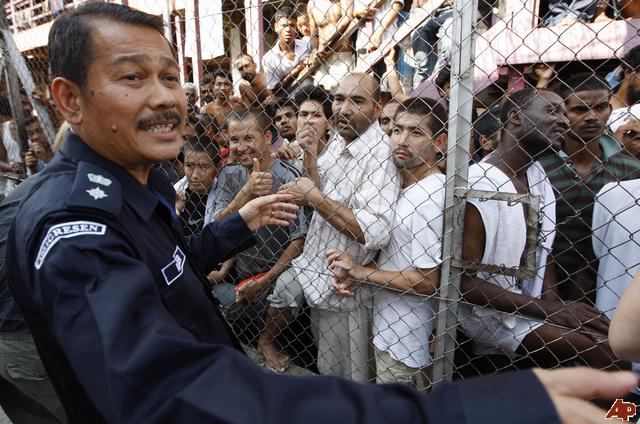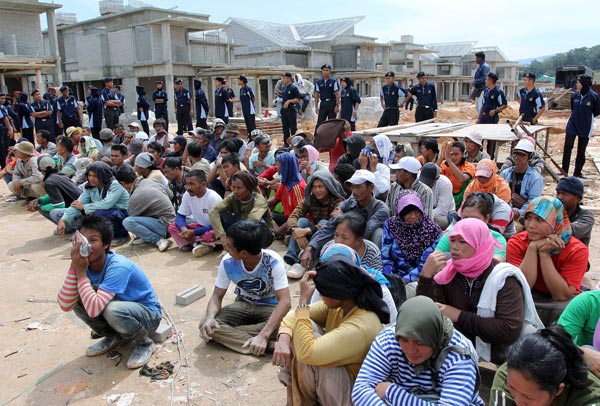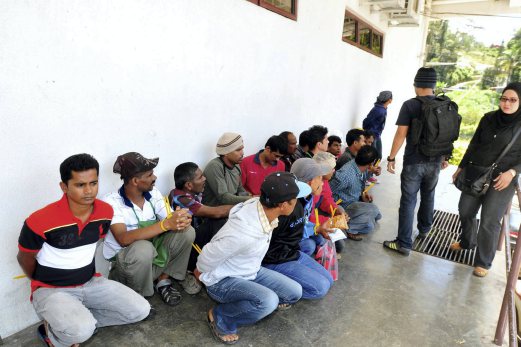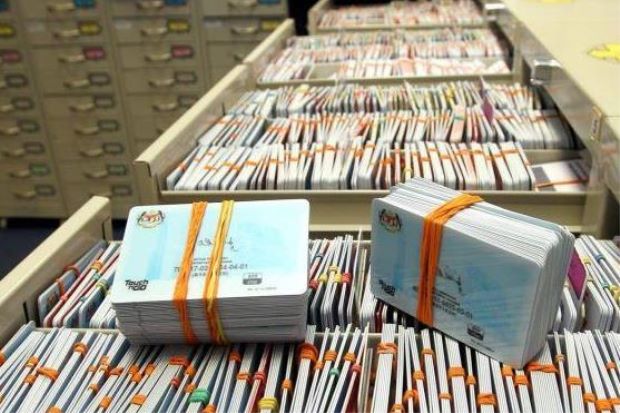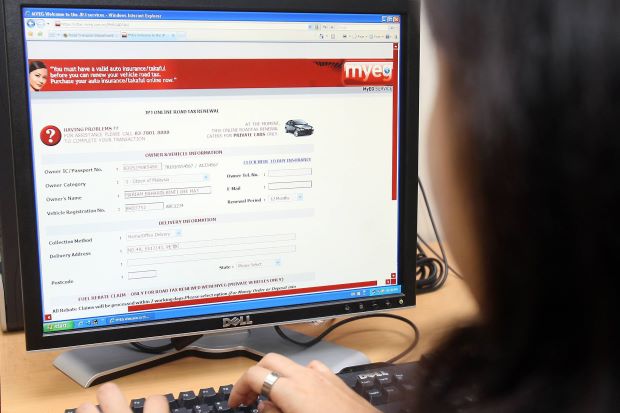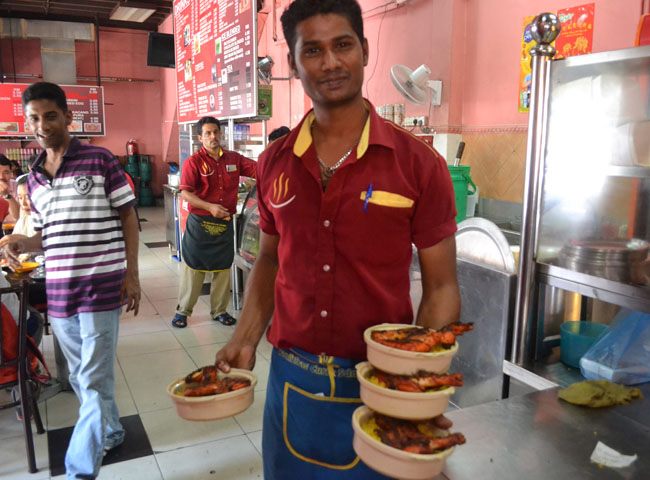Illegal Workers In Malaysia: How Much Do You Know About The Dilemma?
It is no surprise that there has been a high influx of foreigners in Malaysia in the recent years but are you aware of these issues surrounding the dilemma of the nation's illegal immigration situation?
Yes, what you're watching is the streets of Kuala Lumpur during Chinese New Year. This is not Indonesia, Myanmar, Nepal or any other neighboring countries.
We've heard stories of the growing influx of foreigners into our beloved Bolehland, but to witness the full extent of it is shocking. Just how pervasive exactly is our problem with illegal immigration in Malaysia?
Although there are no exact figures, there are millions of undocumented foreign workers in Malaysia. They can start a whole state by themselves!
Due to the rise in labour-intensive industries, Malaysia is estimated to have over 3 million migrant workers, which is about 10% of the Malaysian population. The exact numbers are unknown: there are a million legal foreign workers and perhaps another million unauthorised foreigners.
Nearly 20% (2.2 million) of Malaysia’s workforce are foreign workers, excluding illegal workers. There is an additional 2.2 million illegal foreign workers (Amnesty International, 2010).
Many complain about migrant workers flocking to all the blue collar jobs but that is mainly because hardly any locals want to work in those labour-intensive industries
An estimated six million foreign migrants, most of them illegal, work in factories, plantations, restaurants, and other jobs largely shunned by more-affluent Malaysians.
The Malaysian construction industry provides employment opportunities for 800,000 workers, representing 8% of the total workforce; 69% of these are foreign workers. The employment of foreign workers has been concentrated within the agriculture, construction, and manufacturing sectors.
Could the increasing number and Malaysia's high dependency on foreign labour be causing a negative impact on the economy, as well as creating political and security threats to the nation?
Their labor has helped build Malaysia into Southeast Asia’s third largest economy. But as the economy has weakened, concerns have grown among some Malaysians that foreigners could push down wages and drive up crime.
MPN committee member on economy and management cluster, Professor Dr Asan Ali Golam Hassan said the influx of foreign workers into the country would result in an increase in urban poor households.
The conflict and security dilemma that may result from illegal immigration in Malaysia could upset the social order and lead to political instability. Immigrant groups also may pose a security threat to host countries by smuggling arms or people, forming alliances with domestic opposition groups, or participating in drug trafficking.
So, what exactly is the government doing to curb this growing problem? Is what they're doing enough to get the country out of this predicament?
The government launched an amnesty program back in 2011 so that workers could seek legal recognition, resulting in a total of estimated 1.3 million foreigners signing up!
The government has vacillated in its approach to illegal immigration over the past decade, from whipping and fining people for working illegally in Malaysia, to registering 1.3 million of an estimated two million undocumented foreigners for an amnesty program in 2011.
The Malaysian government launched an amnesty program which allowed people to register with the government and seek legal recognition. Under the program, however, the government reserved the right to “voluntarily” deport anyone who went in for further processing.
Of the 1.3 million people who signed up for the amnesty program, some 330,000 people were deported. These individuals were also permanently banned from entering the country. Another 500,000 were given visas, while the status of other immigrants remains unknown. That program, however, is now coming to an end and the government has announced plans to begin rounding up and deporting illegal immigrants.
 valuewalk.com
valuewalk.com
Following that, the immigration department have been cracking down on undocumented workers. Some of the more notable crackdowns on illegal immigrants witnessed by the nation include Ops 6P and Ops Gempak.
A total of 2,433 illegal immigrants were nabbed by the authorities within 24 hours since the kick off of the Ops 6P Integrated Programme to crackdown on unwanted foreigners in the country.
thestar.com.my"Among those arrested were 717 Indonesians and others from Myanmar (555 persons), Bangladesh (387 persons), and Nepal (229 persons). The rest also included citizens of Cambodia, Vietnam, India, Pakistan, Philippines, China, Nigeria and Thailand," Dr Ahmad Zahid said in a press conference Monday.
thestar.com.myAccording to a Bernama report, its principal assistant director (Control Division) Sakib Kusmi said, 181 illegal immigrants were rounded up in Ringlet, Lembah Bertam, Tanah Rata, Brinchang, Kampung Raja, Tringkap and Kuala Terla.
He said, ”In the operation, 581 foreigners were screened and 181 were detained for not possessing valid travel documents. The illegals were from Vietnam, Sri Lanka, Thailand, Indonesia, India, Myanmar, Nepal and Bangladesh.”
However, despite the government's continuous effort, many have managed to find loopholes and worked around the system. Case in point, the famous Project IC scandal involving some of the nation's most powerful political figures.
Among other things, the RCI panel concluded that syndicates working together with “corrupt officials” had “taken advantage of a weakly institutionalised citizenship system” and the large number of illegal immigrants to illegally issue identification documents for monetary gain.
The controversial “Project IC” had “more likely than not” existed, concluded the Royal Commission of Inquiry (RCI).
“From the evidence of these witnesses, it is clear there was a clandestine exercise involving senior officers in the NRD, Sabah, who apparently acted under orders from their political superiors. This clandestine exercise involved illegal activities relating to the processing and issuance of Malaysian identification documents to illegal immigrants in pursuit of a political agenda,” said the report.
This pressing problem seems to still be undeterred despite endless efforts to solve it. What could be an effective solution to a national dilemma as big as this?
Recently, submission of foreign workers’ work permits (PLKS) went online. This method is more transparent which will assist the government in differentiating between legal and illegal workers
"The online method seems to be more transparent and fast. We don’t have to hire people to take numbers and wait for so long to renew the job permits.
He said the new system would also provide a better monitoring system for employers to be updated with the status of foreign workers they have employed.
The primary objective of the new online system for Foreign Workers PL(KS) Permit Renewal through My E.G.Services Bhd (MyEG) is to differentiate between legal and illegal foreign workers in the country and those who employ the latter.
"MyEG's role is also to compile, verify, maintain, update and analyse the database of legal and illegal foreign workers. This is alongside authorised employers of foreign workers, those who unknowingly have foreign workers registered under their name, as well as illegal foreign workers on their payroll."
The previous manual submission method was proving to be inefficient, and exploited by certain parties. Heard of 'runners'? They exploit and benefit from the manual process, and are now very disgruntled with the switch to digital, as they have lost their income. Yikes!
In a statement dated Jan 2, the department announced that all renewal of foreign workers permits at their counters would be stopped to reduce congestion as well as to avoid employers using middlemen or agents.
thestar.com.myMyEG officers have lodged police reports after being threatened by unhappy individuals over the implementation of the online system for the foreign workers' permit renewal (PLKS). The permit renewal system, which was implemented on January 5 through MyEG, is seen by these individuals, who are believed to be "tontos" or "agents", as a threat to their livelihood.
"Their dissatisfaction and anger is believed to be a result of the loss of income as they have previously acted as ‘agents’ for employers to facilitate foreign workers' work permits at Immigration counters. With the implementation of the online system, they now risk losing an income believed to amount to RM200 to RM300 per transaction," MyEG said in the statement.
However, there is also a downside to going online, with many complaining of the unfamiliarity with the platform. To accommodate those complaints, manual submissions have opened back up until 28 February to ease users into the new system.
The Immigration Department has reopened the Visit Pass - Temporary Employment (PLKS) counters for foreign workers from today (Jan 23) for a 'proof of concept' (POC) period till Feb 28, said its director-general Datuk Mustafa Ibrahim.
During the period, the service would also be available online, he said.
For over the counter renewal of PLKS, employers or directors of companies are required to be present at the counter to submit the applications, not agents or or middlemen, he said.
It's certainly clear that we have to keep a lid on this problem, so that we have it under control. However, it's also important not to lose sight of the other side of the story.
Foreign workers in Malaysia have to go through hardships and take considerable effort to adapt to Malaysia's diverse culture, often picking up more than one language
Malaysia is a country of diverse culture, with majority of the people speaking more than one language. Often times, we would find ourselves speaking to migrant workers in Malay or sometimes even Mandarin or Cantonese. Foreign workers from neighbouring countries quickly learn a new language, sometimes maybe even more than just one, to keep their jobs and survive in the country.
Many migrant workers, legal or illegal, bear through the torment for the significantly higher pay in Malaysia compared to their home countries. Their wages also serve as financial support for their families back home.
As a Nepalese, he works four hours longer than his Malaysian colleagues and for less pay. But that doesn't bother him because even on a salary of 800 Malaysian ringgit per month, Mr Durga makes five times more money than he would earn back home in Nepal.
A plantation worker can earn an average of about 900 ringgit ($280) per month in Malaysia, up to about 2,000 ringgit, compared to an average of about 700 ringgit in Indonesia. But a foreign worker in Malaysia may also have to pay more in taxes and for utilities.
As Malaysia generally pays higher wages than neighboring countries, such as Bangladesh and the Philippines, workers can easily be lured to the country with the promise of high wages and good working conditions.
 valuewalk.com
valuewalk.com
At the end of the day, the issue of illegal foreign labour does not merely end through arrests and deportations, as other factors like the welfare of their children come into play as well
Everyone knows that the issue is an Immigration nightmare, but the solution is not just simply “arrest and deport”. The Working Committee should also consider the possibility of parents being arrested and deported. What will happen to their children? Or what if a husband is arrested and deported? What happens to his Sabah wife? What happens if he has four wives? What will happen to their children? We need a holistic approach. Otherwise, we will end up with more street children.
Then we should also ask hard questions as to how many of our own lawmakers were holders of IMM13 papers and how many of our own law enforcement officers have second and third wives who are illegal immigrants. How then do you propose to reconcile and resolve these entanglements?
The question we have to ask ourselves now is, are there more that we, as a nation should be doing to nip this in the bud? Is the current system working or should we be having a better system in place?
